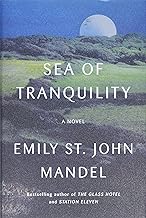4 Stars
Time travel novels do not usually appeal to me, but I made an exception because of the author whose previous novels I’ve enjoyed.There are four timelines. In 1912, Edwin St. John St. Andrew is exiled to Canada. He eventually arrives in British Columbia where he has a strange experience on Vancouver Island. Standing under a maple tree, he momentarily feels like he is inside a vast interior where he hears the hum of people, violin music, and a whooshing sound. In 2020, Mirella Kessler attends a concert featuring Paul Smith who incorporates a video recorded years earlier by his sister Vincent under a maple tree; that video suggests an experience similar to Edwin’s. In 2203, Olive Llewellyn, an author who lives on one of the lunar colonies, is on a book tour on Earth for her novel Marienbad. In her last interview at the end of the tour, she is asked about a scene in her book in which a character in the Oklahoma City Airship Terminal listening to a violinist suddenly feels transported to a forest. In 2401 in a lunar colony, Gaspery-Jacques Roberts, named after a character in Marienbad, is a young man who feels adrift until his sister who works at the Time Institute tells him that “moments from different centuries are bleeding into one another.” He immediately signs up to investigate the anomaly which might be proof that they’re living in a simulation which has a corrupted file. He makes several trips to interview Edwin, Vincent, and Olive while being warned that he must maintain an “almost inhuman level of detachment” so as not to change the past.
Though two of the timelines are in the future, Mandel is not concerned with building elaborate futuristic worlds. Space travel is routine and there is a time machine, but readers will nonetheless feel at home. Olive’s section, for example, suggests that books and bookstores still exist. In her timeline, there are hints of an upcoming pandemic so her experiences mirror ours during Covid-19.
Mandel’s focus is human psychology. Family dynamics, work/life balance, and relationships are concerns for the characters just like they are for 21st-century readers. Characters are searching for a sense of belonging, closure, or meaning, so the technology may be different but humans are still humans.
I loved the messages in the book which emphasize that we are all interconnected. Olive speaks of how humans have a tendency to believe that they are uniquely important: “I think, as a species, we have a desire to believe that we’re living at the climax of the story. It’s a kind of narcissism. We want to believe that we’re uniquely important, that we’re living at the end of history, that now, after all these millennia of false alarms, now is finally the worst that it’s ever been, that finally we have reached the end of the world.” But what may seem like unique moments repeat themselves: three of the characters experience pandemics. And “No stars burn forever”: three of the characters suffer the painful loss of loved ones. We are all part of a larger human story. Someone’s world is always ending, and someday we will all die. In the meantime, we can find meaning in moments of tranquility: Living during a pandemic, Olive treasures the time spent with her daughter and concludes “life can be tranquil in the face of death.” Even if life proved to be a simulation, we can conclude like Gaspery: “So What!” A life lived in simulation is still a life. The rain he experiences on the moon is simulated, but he loves the rain nonetheless.
This novel is both entertaining and thought-provoking. I loved the ending which connects all the storylines in a beautiful way that makes perfect sense. This is speculative fiction at its best.

No comments:
Post a Comment